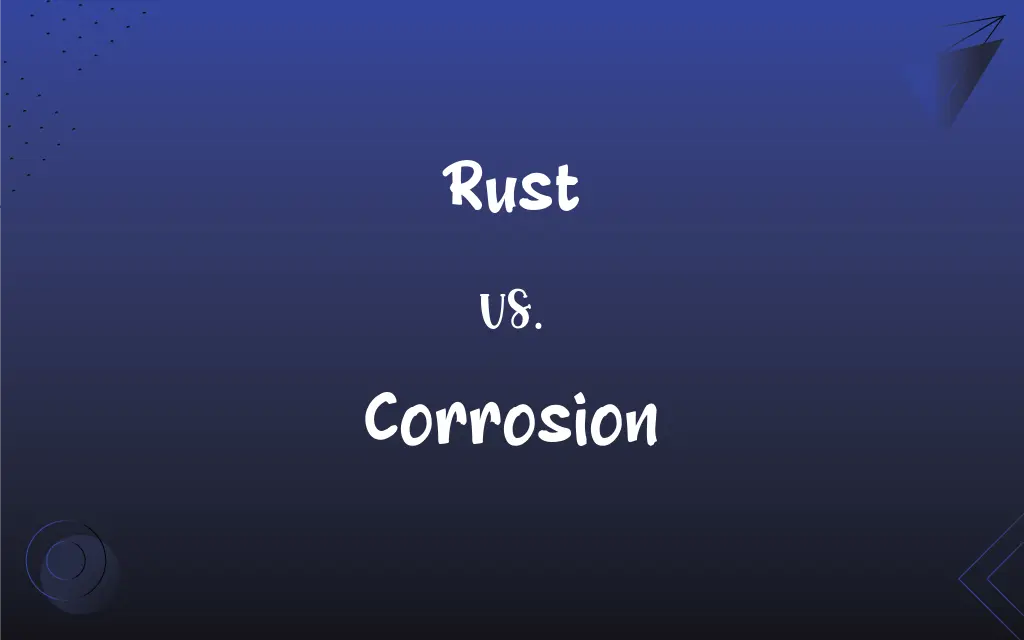Rust vs. Corrosion: What's the Difference?
Edited by Janet White || By Harlon Moss || Updated on October 19, 2023
Rust is the oxidation of iron, while corrosion is the general deterioration of materials through environmental reactions.

Key Differences
Rust specifically refers to the red-brown oxide formed on iron or steel due to a reaction with oxygen and moisture, whereas corrosion is a broader term that describes the destruction of metals or other materials because of a reaction with external agents.
While rust only occurs on iron and its alloys, corrosion can affect a variety of materials, including metals, ceramics, plastics, and more.
Both rust and corrosion can compromise the strength and integrity of materials, but rust is primarily associated with aesthetic and structural issues in iron-containing materials, whereas corrosion encompasses various damages across a range of substances.
Prevention techniques differ; for rust, keeping iron and steel dry and reducing its contact with moisture can help, while corrosion prevention often requires a more comprehensive approach, such as coatings, cathodic protection, or environmental control.
Ultimately, rust can be considered a type of corrosion since it's a specific manifestation of material degradation, but not all corrosion results in rust.
ADVERTISEMENT
Comparison Chart
Affected Materials
Iron and its alloys.
Various materials, including metals.
Appearance
Red-brown oxide.
Varies depending on material/agent.
Causes
Reaction of iron with oxygen & moisture
Reaction of material with external agents
Prevention
Keep dry, reduce moisture contact.
Coatings, cathodic protection, etc.
Broadness of Term
Specific type of corrosion.
General term for material degradation.
ADVERTISEMENT
Rust and Corrosion Definitions
Rust
Rust can compromise the structural integrity of iron or steel.
The bridge was deemed unsafe due to severe rust.
Corrosion
Corrosion can be caused by a range of agents, from oxygen to acids.
The pipes suffered from corrosion due to the chemicals in the water.
Rust
Rust is the red-brown oxide that forms on iron when exposed to moisture.
The old gate had a layer of rust from years of rain exposure.
Corrosion
Corrosion is the gradual deterioration of materials due to environmental reactions.
The old shipwreck was heavily damaged by saltwater corrosion.
Rust
Rust is a specific type of corrosion pertaining to iron and its alloys.
While the steel beams showed signs of rust, the aluminum frame remained intact.
Corrosion
Corrosion can affect a variety of substances, not just metals.
The stone statue showed signs of corrosion from acid rain.
Rust
Rust can be prevented by keeping iron and steel dry.
To avoid rust, he painted the metal fence with a protective coating.
Corrosion
Corrosion impacts both the appearance and functionality of materials.
Visible corrosion on the metal surface indicated a need for maintenance.
Rust
Rust is the product of iron's reaction with oxygen in the presence of water.
The bike left in the rain began to rust after a few days.
Corrosion
Corrosion is a natural process that can be slowed with protective measures.
Using anti-corrosion paint can extend the life of machinery.
Rust
Any of various powdery or scaly reddish-brown or reddish-yellow hydrated ferric oxides and hydroxides formed on iron and iron-containing materials by low-temperature oxidation in the presence of water.
Corrosion
The act or process of corroding.
Rust
Any of various metallic coatings, especially oxides, formed by corrosion.
Corrosion
The condition produced by corroding.
FAQs
What is corrosion?
Corrosion is the general deterioration of materials due to reactions with environmental agents.
What is rust?
Rust is the red-brown oxide that forms on iron or its alloys when exposed to oxygen and moisture.
Are rust and corrosion the same?
Rust is a specific type of corrosion that affects iron and its alloys, while corrosion is a broader term.
Why does rust form?
Rust forms when iron reacts with oxygen in the presence of water.
How can corrosion be slowed or prevented?
Corrosion can be mitigated using protective coatings, cathodic protection, or controlling the environment.
How do coatings protect against rust and corrosion?
Coatings act as a barrier, preventing reactive agents from reaching the material's surface, thus inhibiting rust and corrosion.
Can corrosion be beneficial?
In rare cases, corrosion can provide a protective layer to the underlying material, preventing further damage.
How can rust be prevented?
Rust can be prevented by keeping iron and its alloys dry, using protective coatings, or employing rust-resistant alloys.
What are the visual signs of corrosion?
Signs of corrosion can vary, from rust on iron to green patina on copper to white powdery substances on aluminum.
Is rust dangerous to humans?
While rust itself isn't typically harmful if ingested in small amounts, it can compromise the structural integrity of items.
Can rust be removed?
Yes, rust can be removed using mechanical methods or chemical treatments.
Can rust and corrosion impact the taste or safety of food and drink?
Yes, rust and corrosion can influence the taste of food and beverages, and in some cases, compromise their safety.
What materials are susceptible to corrosion?
Metals, ceramics, and even plastics can undergo corrosion depending on environmental conditions.
Can stainless steel rust?
While stainless steel is resistant to rust due to its chromium content, under certain conditions, it can exhibit signs of corrosion.
Why is corrosion a concern in industries?
Corrosion can lead to material failure, posing risks to safety, and can also result in significant economic costs.
How does saltwater influence rust and corrosion?
Saltwater accelerates both rust formation on iron and corrosion on many materials due to the presence of salts.
How does temperature impact rust and corrosion?
Elevated temperatures can often accelerate the rate of both rust and corrosion.
Is there a way to predict material behavior concerning rust and corrosion?
Scientists use electrochemical methods and accelerated testing to predict and analyze rust and corrosion behavior.
Can aluminum rust?
No, aluminum doesn't rust, but it can corrode, forming a white powdery substance.
Can plastic corrode?
While plastics don't corrode in the traditional sense, they can degrade in response to UV rays, chemicals, or other environmental factors.
About Author
Written by
Harlon MossHarlon is a seasoned quality moderator and accomplished content writer for Difference Wiki. An alumnus of the prestigious University of California, he earned his degree in Computer Science. Leveraging his academic background, Harlon brings a meticulous and informed perspective to his work, ensuring content accuracy and excellence.
Edited by
Janet WhiteJanet White has been an esteemed writer and blogger for Difference Wiki. Holding a Master's degree in Science and Medical Journalism from the prestigious Boston University, she has consistently demonstrated her expertise and passion for her field. When she's not immersed in her work, Janet relishes her time exercising, delving into a good book, and cherishing moments with friends and family.
































































